Developing a Participatory Planning Support System for Sustainable Regional Planning — A Problem Structuring Case Study
Journal article, Peer reviewed
Published version

Åpne
Permanent lenke
https://hdl.handle.net/11250/2789468Utgivelsesdato
2021Metadata
Vis full innførselSamlinger
Originalversjon
https://doi.org/10.3390/su13105723Sammendrag
In this paper, we report on the application of systems engineering in initiating the synthesis of a participatory planning support system (PSS) for sustainable regional planning. The systems engineering SPADE approach is applied in a model-based fashion to define and link sustainable development goals (SDGs) to regional and urban planning policies in a co-creative multi-stakeholder environment. The approach is demonstrated through a case study from the interregional climate, land-use, and transportation planning process (PAKT) in the Ålesund region in Norway. The work was performed using focus groups with planning stakeholders over a series of workshops to analyze, design, verify and validate the problem structure. Our study shows that the approach is useful for integrating and operationalizing the SDGs in a planning context. The methodology also brings clarity and structure to planning problems and provides a pedagogical frame to engage stakeholders in co-creative PSS synthesis. Further research is necessary to explore how structured elements may be exploited in PSS synthesis.
